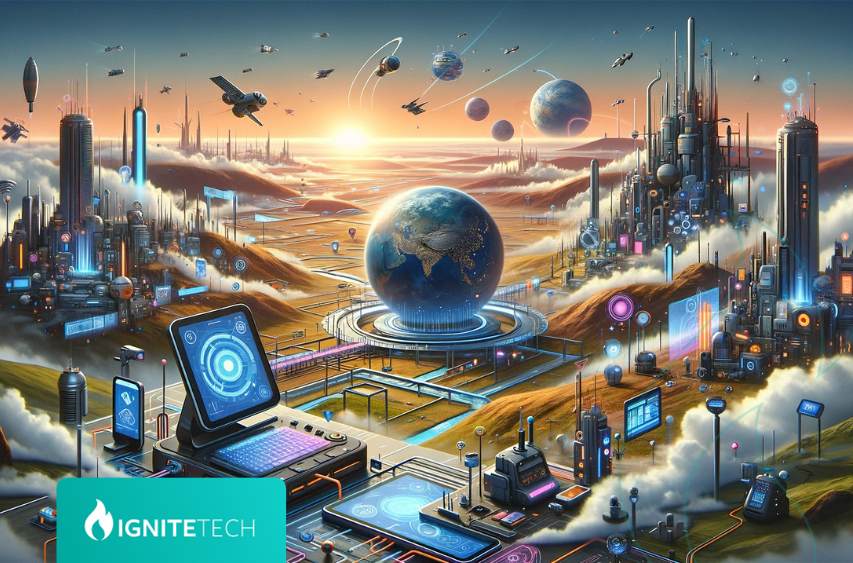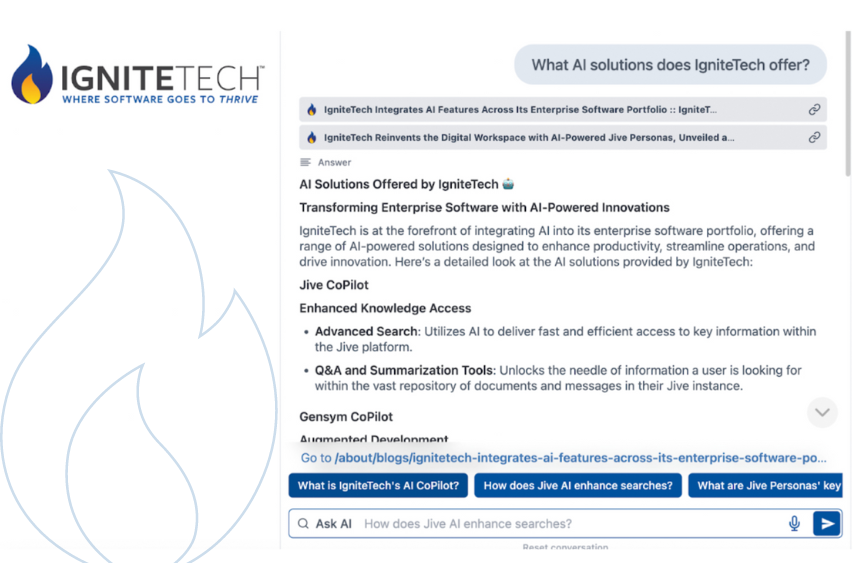As we embrace the early days of 2024, the technology landscape continues evolving at an extraordinary pace, profoundly shaping how we work, live, and interact. The recent years have been marked by rapid technological advancements, driven by both relentless innovation and global events that required swift adaptation and evolution.
In this blog, we will delve into a diverse range of trends that are currently shaping our technological landscape. From the ongoing evolution of Artificial Intelligence (AI) to the intricacies of quantum computing, the rise of zero-trust models, and the focus on sustainable technology practices, these trends are reshaping business models, work dynamics, and societal norms.
So, join us on a journey through the transformative trends of 2024, a year where innovation meets the day-to-day, and the possibilities are boundless. Welcome to an exciting exploration of the future of technology, already unfolding around us.
AI Taking Center Stage

AI has transitioned from being a buzzword to a tangible reality, already reshaping our world. In 2024, AI will emerge from research labs and become integral to the daily operations of various industries, fundamentally changing how businesses operate and make decisions.
Industries ranging from healthcare to finance, retail, and manufacturing are leveraging AI to automate complex processes, enhance decision-making, and provide more personalized customer experiences. In healthcare, AI-driven predictive diagnostics are improving patient care, while in finance, AI algorithms are revolutionizing risk assessment and fraud detection. The retail sector sees AI personalizing shopping experiences, and manufacturing uses AI for optimizing supply chains and production efficiency.
IgniteTech is at the forefront of this AI transformation, having launched our GenAI initiative with the CoPilot series, a clear demonstration of our commitment to leading in next-generation enterprise solutions. The CoPilots, leveraging GenAI, are ingeniously integrated across multiple areas and products, bringing a new level of intelligence and efficiency to the business landscape.
Among the diverse applications in our extensive 50+ product portfolio, Jive CoPilot, DNN CoPilot, and AnswerHub CoPilot stand out as prime examples of how we're harnessing GenAI to enhance user experiences and operational efficiency.
Take, for example, Jive CoPilot. This GenAI-powered assistant is transforming how employees interact within the Jive Platform. Enhanced search and AI-driven text generation make finding and sharing information easier and more insightful.
DNN CoPilot streamlines content creation, offering intuitive tools for more efficient work, while AnswerHub CoPilot simplifies data access for technical teams, enhancing productivity with its smart, focused solutions.
The evolution of AI does not diminish the importance of human skills and intuition; rather, it highlights the need for effective human-AI collaboration. Upskilling and reskilling initiatives are becoming essential to prepare workforces to work alongside AI, leveraging the strengths of both human creativity and AI's analytical power. This synergy is critical where ethical considerations and nuanced decision-making are paramount.
Hyperscalers Driving Real-Time Ecosystems

In 2024, hyperscalers will become a key force in transforming the landscape of data analytics. These powerful computing systems offer unparalleled processing capabilities that revolutionize how businesses handle and analyze data. They allow organizations to process vast amounts of data at an unprecedented speed, providing insights that were previously unattainable.
One of the most significant advantages of hyperscalers is their ability to facilitate real-time data processing. In today's fast-paced business environment, the ability to analyze data as it is generated is invaluable. This real-time processing enables businesses to make quicker, more informed decisions, respond promptly to market changes, and capitalize on emerging trends. It also allows for continuous fine-tuning of operations, leading to increased efficiency and better customer experiences.
Focus on Zero Trust Models

The concept of Zero Trust Models has gained significant traction, especially in hybrid work environments. The shift to remote and hybrid work setups has expanded the traditional perimeter of corporate networks, making traditional security models less effective. Zero Trust Models operate on the principle of "never trust, always verify”. This approach ensures that security is maintained regardless of where the network access occurs, making it a crucial strategy for modern businesses.
Implementing a Zero Trust Model involves a comprehensive overhaul of the existing security framework. It requires businesses to verify every access request as if it originates from an open network, regardless of the user's location or the network used. This means continuous validation of every request to access the company's systems and data, which helps in preventing unauthorized access and potential breaches.
In 2024, these models will integrate advanced technologies like AI and machine learning for better threat detection and response. Companies are using these technologies to analyze patterns, detect anomalies, and automate responses to security incidents. Additionally, the integration of biometrics and other advanced authentication methods is becoming more common, adding an extra layer of security and ensuring that access is granted only to authorized individuals.
The focus on Zero Trust Models in 2024 reflects the evolving cybersecurity landscape. As organizations adapt to new ways of working and the increasing sophistication of cyber threats, Zero Trust Models offer a more dynamic and effective approach to securing corporate data and systems.
Progress in Quantum Computing

This revolutionary technology, based on the principles of quantum theory, promises to solve complex problems much faster than traditional computers. The advancements in quantum computing are particularly noticeable in areas requiring immense computational power, such as cryptography, drug discovery, and complex data analysis.
Quantum computers, with their superior processing capabilities, can analyze and decipher complex datasets much faster than conventional computers. This capability is a double-edged sword; while it can lead to breakthroughs in various fields, it also poses new challenges for data security.
As quantum computing continues to evolve, businesses and governments are preparing for a quantum future. This includes investing in quantum computing research, developing quantum computing skills within the workforce, and exploring potential applications in their operations. The race to harness the power of quantum computing is also leading to strategic partnerships and investments, as stakeholders recognize the transformative potential of this technology.
2024 marks a pivotal year in the journey of quantum computing, as it starts to find practical applications and significantly impacts data security and business operations. As the capabilities of quantum computing continue to grow, it is poised to become a critical tool in solving some of the most complex problems in the modern world.
Navigating the Tech Horizon of 2024
As we reflect on the technological landscape of 2024, it's clear that we are in the midst of a remarkable era of innovation and transformation. From the practical applications of AI revolutionizing business operations to the emergence of hyperscalers driving real-time data ecosystems, the advancements we'll witness this year are shaping the future of how we interact with technology.
As we look toward the future, these trends offer a glimpse into a world where technology is a fundamental driver of business, security, and innovation. The key for businesses and individuals alike is to stay informed, adaptable, and proactive in leveraging these technologies. By doing so, we can harness their potential to drive growth, enhance security, and solve some of the most pressing challenges of our time.
In closing, 2024 stands as a milestone year in the technological journey, signaling a shift towards more integrated, secure, and intelligent systems. The advancements we've seen are just the beginning of what promises to be an exciting, transformative journey into the future of technology.






